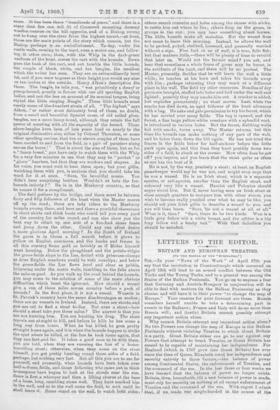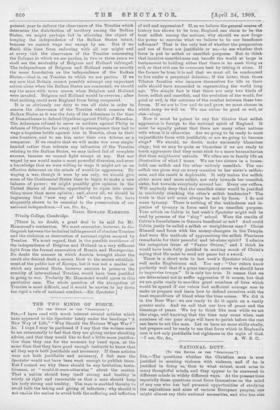LETTERS TO TIIE EDITOR.
BRITAIN AND EUROPEAN TREATIES. ere TUN iturron 01, etre SynorAroa."1
SIE,—In your "News of the Week" of April 17th you say that the revolution in Constantinople which occurred on April 13th will lead to an armed conflict between the Old Turks and the Young Turks, and to a general war among the States of the Balkan Peninsula. You go on to express a fear that Germany and Austria-Hungary in conjunction will be able to deal with matters (in the Balkan Peninsula) as they choose, and will have it in their power "to change the map of Europe." Your reasons for your forecast are these. Russia considers herself unable to take a determining part in events in the Balkans; Franc* and Italy will do no more than Russia will; and (lastly) Britain cannot possibly attempt any important action alone.
.Why cannot Britain attempt any important action alone2 No two Powers can change the map of Europe in the Balkan Peninsula without violating Treaties to which, Great Britain is a party, Great Britain either can go to war against any Powers that attempt to break Treaties, or Great Britain has ceased to be capable of maintaining her independence. For England (which in 1707 grew into Great Britain) has ever since the time of Queen Elizabeth owed her independence and security entirely to three factors,—the balanee of power among Continental States, the enforcement of Treaties, and the cow nutud of the sea. I the last three or four weeks we have learned that the balance of power no longer exists. Britain, then, henceforth, till a new balance of power is made, must rely for security on nething at all except enforcement of Treaties and the command of the sea. With regret I admit that, if we made wet., single-handed. in the course of the present year to enforce the observance of the Treaties which determine the distribution of territory among the Balkan States, we might perhaps fail in attaining the object of keeping the independence of the Balkan States intact, because we cannot wage war except by sea. But if we flinch this time from enforcing with all our might and at every risk the observance of the Treaties concerning the Balkans to which we are parties, in two or three years we shall see the neutrality of Belgium and Holland infringed. The independence of Belgium and Holland rests on exactly the same foundation as the independence of the Balkan States.—that is, on Treaties to which we are parties. If we say now that Britain cannot possibly attempt any important action alone when the Balkan States are concerned, we should say the same with more reason when Belgium and Holland were invaded. Belgium and Holland would be overrun ; after that nothing could save England from being conquered.
It is as obviously our duty to run all risks in order to ensure the observance of the Treaties whieh concern the Balkan States as it. was the duty of the Athenians in the time of Demosthenes to defend Olynthus against Philip of Macedon. The Athenians refused to serve as soldiers against Philip in defence of Olynthus far away, and in consequence they had to wage a hopeless battle against him in Boeotia, close to their on frontiers, and to see him enter their own Athens as a conqueror. If we resolve that we will make war even single- handed rather than tolerate any infraction of the Treaties relating to the Balkan States, we may indeed fail of complete success, because we cannot fight except at sea. But war waged by sea would make a most powerful diversion, and even a knowledge that we were willing to wage it might act as am effective deterrent on the minds of would-be aggressors. By waging a war, though it were by sea only, we should give some of the Continental States time to begin to make a new balance of power; we might possibly give opinion in the United States of America opportunity to ripen into some- thing more than mere opinion ; and, above all, we should be beginning that "new way of life " which you, Sir, have eloquently shown to be essential to the preservation of our national indepeedence.—I urn, Sir, Stc.,
BASIL EDWARD HAMMOND. Trinity College, Cambridge.
[There is, no doubt, a great deal to be said for Mr. Hatnmond's contention. We must remember, however, to dis- tinguish between the technical infringement of obsolete Treaties and the violation or destruction of national rights secured by Treaties. We must regard, that is, the possible overthrow of the independence of Belgium and Holland in a very different light from the formal annexation of Bosnia and Herzegovina. No doubt the manner in which Austria brought about the result she desired dealt a severe blow to the secure establish- ment of the public law of Europe, but it was not a matter on which any neutral State, however anxious to preserve the sanctity of international Treaties, would have been justified in going to war. Probably Mr. Hammond would agree in this particular case. The whole question of the abrogation of Treaties is most difficult, and it would be unwise to lay down too rigid a rule of national conduct.—En. Spectator.]























































 Previous page
Previous page